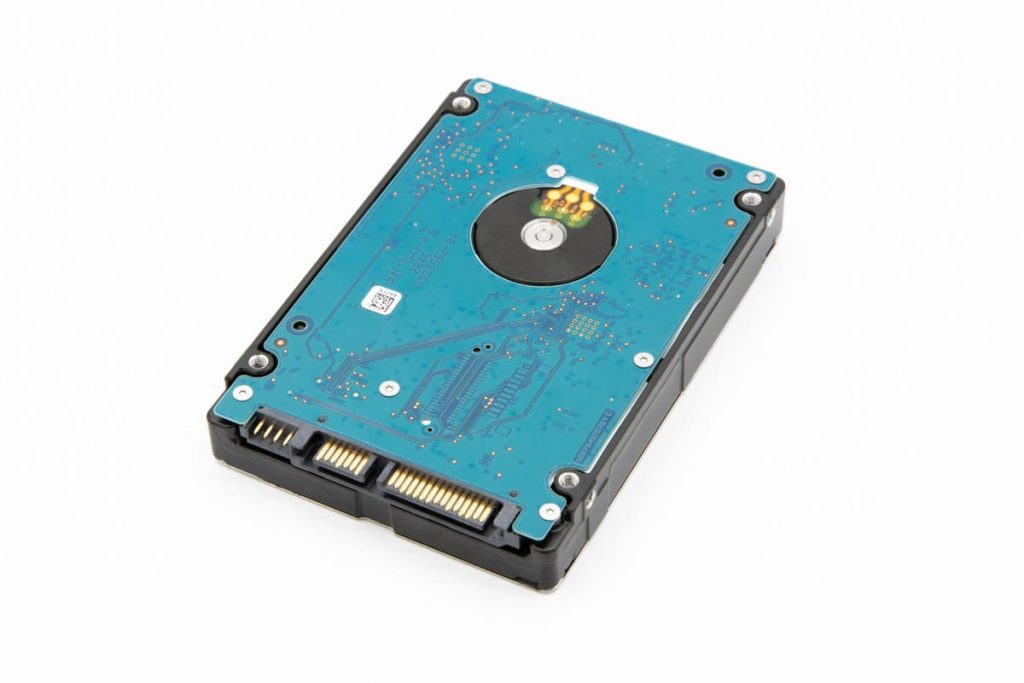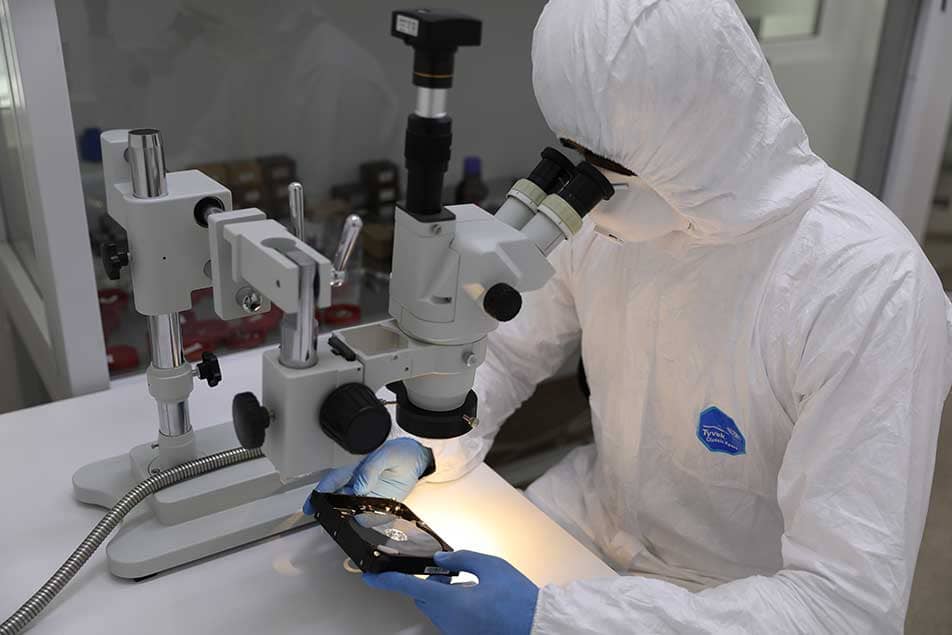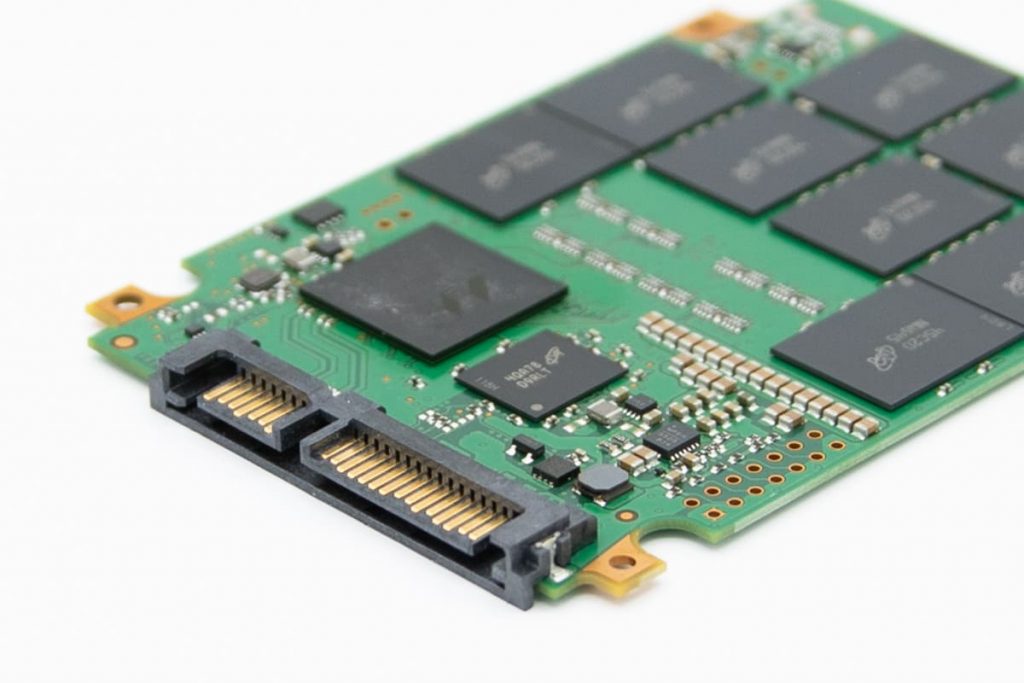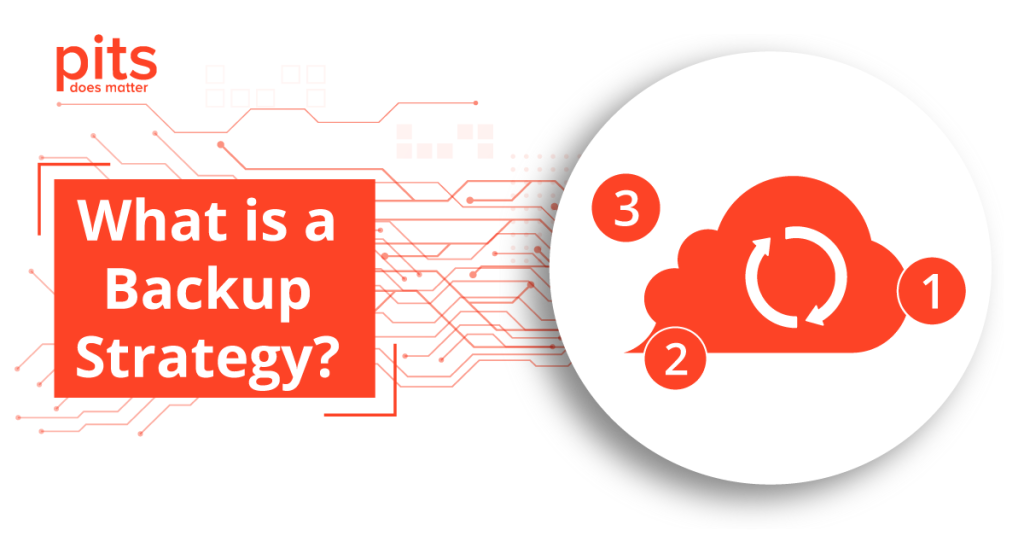Hard disk drives (HDDs) have come a long way since their introduction in the 1950s, with modern drives capable of storing terabytes of data. The hard drive is an essential computer system component in today’s world. It is a non-volatile storage device that stores digital information on magnetic or solid-state platters.
In this blog post, our recovery team will explore what a hard drive is, how it works, its role in a computer system, how hard drive usage is calculated, and what causes a hard drive to reach 100% usage.
How Does a Hard Drive Work?
A hard drive is a storage device used to store and retrieve digital data. It consists of one or more platters coated with a magnetic material. The platters are mounted on a spindle and spin at high speed while a read/write head moves across the surface of the platters to access the data.
A hard drive works by storing and accessing data from the magnetic surface of its platters. The platters are divided into tracks, which are further divided into sectors. Each sector can hold a fixed amount of data, typically 512 bytes.
When data is written to the hard drive, the read/write head magnetizes the platter’s surface to represent the data. If data is read from the hard drive, the read/write head detects the magnetic changes on the platter’s surface and converts them into digital data that the computer system can use.
What is the Role of a Hard Drive in a Computer System?
The hard drive is one of the primary components of a computer system, along with the CPU, RAM, and motherboard. It is responsible for storing the operating system, applications, and user data.
The operating system is loaded from the hard drive into RAM when the computer is turned on. The applications are also loaded from the hard drive into RAM when launched. User data, such as documents, music, videos, and photos, are stored on the hard drive.
How is Hard Drive Usage Calculated?
Hard drive usage is calculated by measuring the amount of data being read from and written to the hard drive. This is typically measured in terms of the number of input/output operations per second and the amount of data being transferred per second (throughput).
IOPS measures the number of read/write operations that are being performed by the hard drive in a second. Throughput measures the amount of data being transferred between the hard drive and computer system in seconds.

Why is My Hard Drive Running at 100%?
When your hard drive is operating at full capacity, it usually suggests that your computer’s storage system is experiencing a heavy workload. As a result, you may encounter sluggish performance and delays when accessing files or running programs. Here are the common causes of the hard drive’s full operating issue.
Background Processes
Background processes are tasks that run in the background of a computer system, such as antivirus scans, system updates, and disk defragmentation. These processes can cause the hard drive to reach 100% usage, requiring a significant amount of read and write-operations.
To reduce the impact of background processes on hard drive usage, it is recommended to schedule them at times when the computer system is not in use, such as overnight or on weekends.
Malware
Malware is malicious software designed to harm a computer’s internal system. Some types of malware, including ransomware, can cause the hard drive to reach 100% usage by encrypting files and demanding a ransom payment to restore them.
Fragmented Files
Fragmented files are stored in multiple locations on the hard drive. This can cause the hard drive to work harder to access the data, as it needs to read from various parts.
To prevent fragmented file issues, performing regular disk defragmentation is recommended. This process rearranges fragmented files on the hard drive, allowing the read/write head to access the data more efficiently.
Large Files
Large files, such as video files or large software installations, can cause the hard drive to reach 100% usage when being read from or written to the hard drive. This is because the read/write head needs to access a large amount of data, which can slow down the system.
It is recommended to store files on a separate hard drive or external storage device. This will allow the main hard drive to focus on the system and smaller data files.

Hardware Issues
Hardware issues, such as a failing hard disk drive or a faulty SATA cable, can cause the hard drive to reach 100% usage. This is because the hard drive may need to perform additional read and write operations to compensate for the faulty hardware.
The hard drive is an essential computer system component responsible for storing and retrieving digital data.
Hard drive usage is calculated by measuring the number of read and write operations and the amount of data being transferred. Causes of 100% usage on a hard drive include background processes, malware, fragmented files, large files, and hardware issues. However, there are several ways to avoid this problem on your device.
Ways to Prevent 100 Percent Hard Drive Usage
Close Unnecessary Programs
Running too many programs or apps simultaneously can cause the hard drive to work harder, leading to 100% usage. Closing programs you are not currently using can help reduce the load on the hard drive.
Disable Startup Programs
Programs automatically starting with the computer can also contribute to high hard drive usage. Disabling unnecessary startup programs can reduce the load on the hard drive and speed up the boot process.
Perform Regular Disk Cleanup
Over time, the hard drive can accumulate temporary files, system files, and other junk files that take up space and slow down the system. Performing regular disk cleanup can help free up space on the hard drive and reduce the load on the read/write head.
Perform Regular Disk Defragmentation
Fragmented files can cause the hard drive to work harder to access data, leading to high hard drive usage. Performing regular disk defragmentation can help rearrange fragmented files on the hard drive, allowing the read/write head to access data more efficiently.
Upgrade to an SSD
Solid-state drives are faster than traditional hard disk drives. Upgrading to an SSD can significantly improve system performance and reduce the likelihood of using the hard drive 100%.
Keep Antivirus Software Up to Date
Malware can cause the hard drive to work harder, leading to high usage. Keeping your antivirus software updated and running regular scans can detect and remove malware from your system.

Replace Failing Hardware
Failing hardware, such as a failing hard drive or a faulty SATA cable, can cause the hard drive to work harder, leading to high usage. Replacing failing hardware can help prevent hard drive 100% usage and improve system performance.
By following these tips, you can prevent hard drive 100% usage and improve overall system performance. It is critical to note that the steps you take will depend on the specific cause of high hard drive usage on your system. If you are unsure what is causing the issue, running a diagnostic test or consulting with a professional may be helpful.
More Tips on 100% Hard Drive Usage Prevention
In addition to the measures mentioned above, there are also some habits that can help reduce hard drive usage over time. For example, avoiding downloading and installing unnecessary programs, deleting files and folders that you no longer need, and regularly backing up important data can all help reduce the load on the hard drive.
It is also important to keep your OS and software updated with the latest updates and security patches. These updates often include performance enhancements and bug fixes that can help improve system performance and reduce hard drive usage.
In summary, hard drive 100% usage can be a frustrating and time-consuming problem, but there are several steps you can take to avoid it from happening. By following the tips outlined above, you can reduce the load on the hard drive, improve system performance, and ensure that your computer runs smoothly. However, if you are experiencing issues with high hard drive usage, it may be worth consulting with a professional to diagnose and fix the underlying problem.
100% Disk Usage: Is My Hard Drive Failing?
PITS Global Data Recovery Services is a trusted provider of recovery services for failing hard drives. We are dedicated to delivering efficient, reliable, and advanced data recovery solutions for businesses and individuals. Our experienced team of data recovery experts can recover data from a failed hard drive, regardless of the cause of the failure.
We offer a comprehensive range of data recovery services, including logical data recovery, physical data recovery, RAID data recovery, Mac data recovery, and external hard drive data recovery. Our experts have extensive experience working with various hard drive models, brands, and sizes, making us a trusted partner for data recovery services.
Our logical data recovery service can recover data from hard drives damaged by software errors or viruses. We use advanced techniques and tools to restore data from damaged file systems, corrupt partitions, and other logical errors. Our physical data recovery service, on the other hand, can recover data from hard drives damaged by physical trauma. Our experts can repair or replace damaged components to restore data from even the most severely damaged hard drives.
At PITS Global Data Recovery Services, we offer a “no data, no fee” guarantee, meaning that if we are unable to recover your data, you will not be charged. We also provide safe and advanced recovery software to ensure our customers receive the best recovery service.
If you are experiencing issues with a failing hard drive, do not hesitate to contact PITS Global Data Recovery Services. Our team of recovery experts is standing by to help you recover your data quickly and safely.
Frequently Asked Questions
Why is my hard drive constantly at 100% usage?
If your hard drive is consistently at 100% usage, it can indicate several potential issues. These include excessive background processes, software conflicts, outdated drivers, malware or viruses, a fragmented disk, insufficient RAM, or a failing hard drive. Identifying the specific cause is crucial for troubleshooting and resolving the problem.
How can I determine the cause of my hard drive running at 100% usage?
To identify the cause of your hard drive running at maximum usage, you can start by opening the Task Manager in Windows (press Ctrl + Shift + Esc) and sorting processes by “Disk Usage.” This will show which programs or services are consuming the most disk resources. Additionally, you can use antivirus software to scan for malware and check for any disk-related errors in the Event Viewer.
Is 100% hard drive usage harmful to my computer?
While it’s not uncommon for the hard drive to reach 100% usage temporarily during certain tasks, sustained high usage can impact your computer’s performance. It can lead to slow response times, system freezes, and overall sluggishness. Additionally, constant high disk usage may contribute to the wear and tear of the hard drive, potentially reducing its lifespan.
What if my hard drive is always at 100% even after troubleshooting?
If your hard drive continues to show maximum usage even after troubleshooting steps, it’s possible that the issue is hardware-related. It could indicate a failing hard drive or an underlying problem with the system’s hardware. In such cases, it is advisable to back up your important data immediately and consult a professional technician or contact the manufacturer’s support for further assistance.
Will adding more RAM help with high hard drive usage?
Adding more RAM (Random-Access Memory) can potentially help with high hard drive usage. RAM serves as a temporary storage space for frequently accessed data, reducing the need for continuous disk access. By providing more RAM, your system can cache and hold more data in memory, leading to improved performance and potentially reducing the strain on the hard drive.


